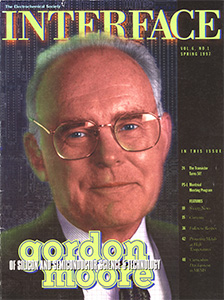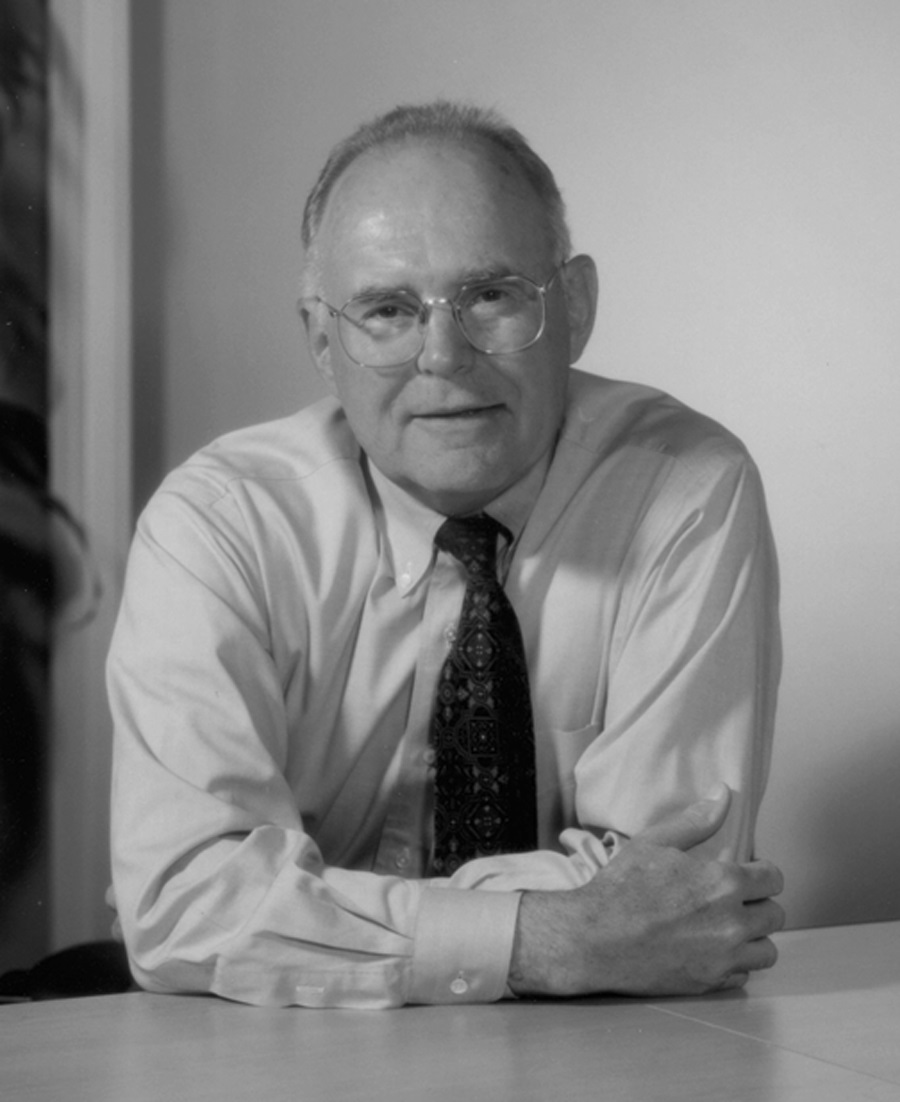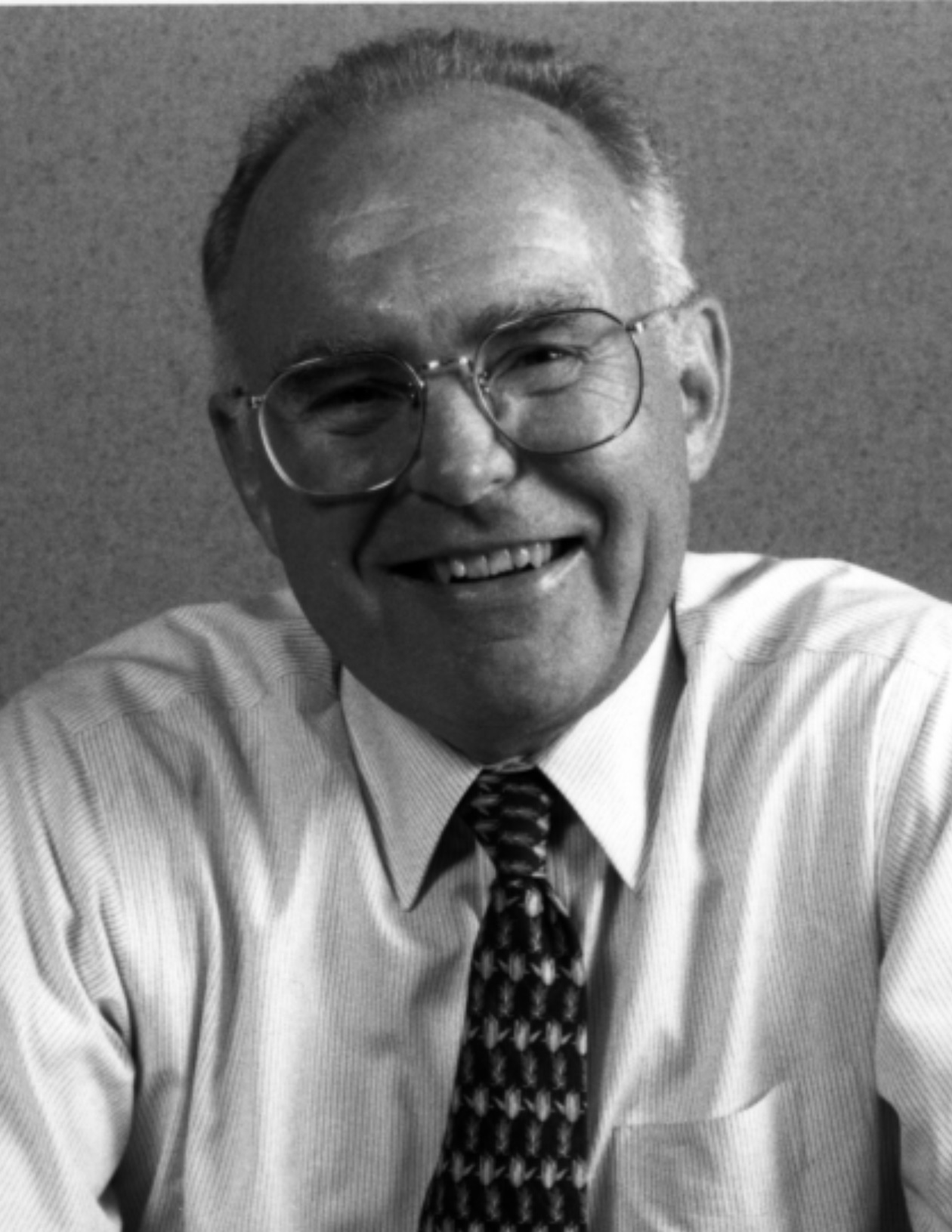Intel co-founder called Society his “home court”
The Electrochemical Society mourns the passing of longtime member, Gordon E. Moore, on March 24, 2023.
“It is difficult to overstate the importance and impact of Dr. Moore’s career, not only to solid state science, but to society in general. Simply put, his seminal work defines the technological world of the 21st Century. It helped enhance the human experience and advance the quality of life. On behalf of the entire ECS community, I humbly ask you to join in honoring and celebrating the life of Gordon E. Moore,” said ECS President Turgut Gür.
“While the world knew Gordon Moore as the co-founder of Intel Corporation and author of Moore’s Law, many at ECS came to know him on a more personal level during his 66 years as a member. We tracked the extraordinary progress of his research at ECS meetings and publications. He has been characterized as the ‘quiet revolutionary.’ At the Society, he was the active mentor to a generation of scientists following his lead in the semiconductor revolution which powers just about everything today. He had that rare combination of scientific genius and business acumen,” said Christopher Jannuzzi, ECS Executive Director and Chief Executive Officer.
The 2021 Moore Medal recipient, Hiroshi Iwai, Professor Emeritus at the Tokyo Institute of Technology, and Vice Dean and Distinguished Chair Professor of National Chiao Tung University, said, “The evolution history of micro-nanoelectronics is summarized in one phrase: Moore’s Law. But what I admired most about Dr. Moore is that not only was he the father of nanoelectronics, and a true titan of industry, he remained active in technical conferences for many years, not only delivering talks himself, but also listening to others’ presentations with sincerity and giving appropriate questions and comments. I was fortunate enough to have had opportunities to meet him at conferences in the United States from 1980 to 1997. He was always a gentleman, and I can still see his gentle gaze and hear his kind voice in my mind.”
In a 2016 ECS Masters interview, Dr. Moore describes his progress from a childhood in a small farming community near the California coast, to co-founding and directing Intel, the world’s largest semiconductor chip manufacturer by revenue. When he was 13 years old, a neighbor got a chemistry kit. Dr. Moore’s interest in science was sparked when he learned how to make explosives, starting with gun powder, and moving on to nitro glycerin and other things. He went on to “blow up” the technology world with his role in creating the processes leading to the memory and microprocessors that all electronic devices use today. Along the way, he parlayed a $500 investment into a multi-billion dollar fortune that endowed a foundation to create positive outcomes for future generations, fostering path-breaking scientific discovery, environmental conservation, and more.
Dr. Moore described the ECS San Francisco Section as his “home court.” He joined as a member in 1957 after completing his PhD at the California Institute of Technology in 1954. At the 1964 ECS Section Meeting, he presented “The Evolving Technology of the Semiconductor Integrated Circuits,” where he began to lay out the underlying foundation of Moore’s Law and his vision for the future potential of semiconductor electronics. Moore’s Law became one of the most influential technical and business predictions of all time. While originally intended as a rule of thumb, Moore’s law has become the guiding principle for the industry to deliver ever more powerful semiconductor chips at proportionate decreases in cost. Dr. Moore delivered the ECS Lecture, “A Perspective on VLSI,” at the 159th ECS Meeting in 1981. He again presented the ECS Lecture, “Fifty Years of Semiconductor Technology,” at the 191st ECS Meeting in 1997. He was named ECS Honorary Member in 2007.
 In 2005, the ECS Solid State Science and Technology Award for distinguished contributions to the field of solid state science and technology was renamed in Dr. Moore’s honor through a $150,000 endowment from Intel in honor of its co-founder. The Gordon E. Moore Medal for Outstanding Achievement in Solid State Science & Technology honors scientists and engineers making distinguished contributions to the field of solid state science.
In 2005, the ECS Solid State Science and Technology Award for distinguished contributions to the field of solid state science and technology was renamed in Dr. Moore’s honor through a $150,000 endowment from Intel in honor of its co-founder. The Gordon E. Moore Medal for Outstanding Achievement in Solid State Science & Technology honors scientists and engineers making distinguished contributions to the field of solid state science.
The ever-prescient Dr. Moore stated in the 1997 spring issue of Interface (featuring his picture on the cover), “We have a fair ways to go just to continue to push the technology to smaller and smaller things, higher and higher performance. The people who use that technology to make products will then have billions of transistors on a chip to work with, and that gives them almost open-ended possibilities.” The technological revolution Dr. Moore ignited over 75 years ago continues to generate new innovations. In the Masters interview, he described the Society as an asset that makes possible today’s technological advancements. Dr. Moore will be sorely missed by ECS, his family, and the world.
The Electrochemistry Society (ECS)
The nonprofit professional Electrochemical Society has led the world in electrochemistry and solid state science and technology and allied subjects since 1902. We advance scientific theory and practice through publications, meetings, continuing education, and collaboration. Our robust global membership develops solutions to the planet’s major challenges. Scientists, engineers, and industry leaders share research at ECS biannual, co-hosted, and sponsored meetings. The ECS Digital Library on IOPscience hosts abstracts and highly peer-reviewed articles from publications, including the Journal of The Electrochemical Society (the oldest journal in its field), ECS Journal of Solid State Science and Technology, and new open access journals ECS Sensors Plus and ECS Advances.
Media Contact
The Electrochemical Society
Shannon Reed
Director of Community Relations
609.737.1902, Ext. 107
Shannon.Reed@electrochem.org


